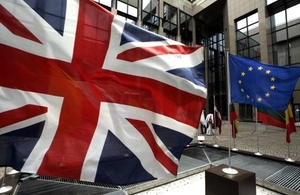Call for project concepts: Reuniting Europe programme 2015/2016 in Bosnia and Herzegovina
British Embassy Sarajevo announces a call for project concepts under its Reuniting Europe programme for the financial year 2015 to 2016.

Background and context
The Foreign and Commonwealth Office, through the Diplomatic Influencing and Values Reuniting Europe programme, supports partner countries with the reforms necessary for future EU accession or closer partnership with the EU. Further information can be found in the Diplomatic Influencing and Values Reuniting Europe Strategy 2015-16.
Duration of projects
Proposed projects should run between 1 April 2015 and 31 March 2016.
Eligibility criteria
Project concepts are welcome from:
- State, entity, and cantonal institutions
- International and domestic civil society organisations
Submission of project concepts
Proposals are to be submitted in the form of project concepts, using the and .
If successful at the concept stage, applicants will be required to complete a full project documentation. A request to provide a full project proposal does not constitute an agreement to fund a project, only that the Embassy is interested in receiving further details.
Project concepts should be addressed, in electronic format, to: fcoprojects@bih.net.ba
Deadline for submission is 1 February 2015.
Priority issues
Project concepts that tackle one of the following priority issues, notably supporting the Compact for Growth are particularly welcome:
- to update financial management procedures and support rigorous economic policy-making to reduce fraud, corruption and waste, increase transparency and confidence in public sector economic decisions, and prioritise the allocation of resources appropriately, at both national and sub-national levels;
- to support reforms that ensure a rules-based system by increasing legal certainty, improving access to timely adjudication of disputes, and demarcating the roles of economic and political power;
- to support the business environment through facilitating their involvement in the policy-making process, which helps to improve business regulatory frameworks; progress will be checked against World Bank Ease of doing business rankings;
- to strengthen labour markets and reduce emigration push factors, by helping lower barriers to employment, facilitating the transition of workers from the informal to the formal sector, supporting the provision of education and skills relevant to labour market needs at all levels, and encouraging and supporting entrepreneurship;
- to put in place structures, mechanisms and skills for the planning and co-ordination of the EU integration process, including developing capacity in local and regional authorities to improve their chances of gaining access to, and effectively deploying, EU funds;
- to establish legal and institutional checks and balances in support of greater transparency in policy-making and implementation;
- to support economic and financial reforms in Bosnia, which spur the development of inclusive, rules-based market economies that meet the conditions for the EU enlargement.
Desirable types of projects
Delivery indicators or desirable types of projects are as follows:
- projects operating at the policy-making level, influencing the development of policy or the public and media debate;
- projects which envisage a follow-up funded by host governments or other donors, which seek to leverage the value of the original project where viable;
- projects that include a gender element and/or look to engage youth or minorities;
- project bids should provide clear evidence of how the project fits into future EU funding plans and therefore has the potential to leverage IPA (EU) funds after project completion;
- successful project bids demonstrate: (a) evidence of consultation with other donors, (b) provision for sustainability, and (c) the capacity to engage host government Ministers or senior officials;